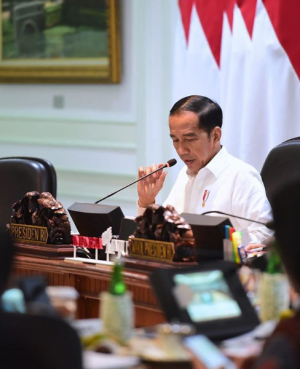With China’s growing economy in the last 10 years, tourism has become increasingly popular among the Chinese people. Chinese visitors currently make up the largest portions of international tourist arrivals in many parts of Asia and are also growing their share of the tourist markets in Europe and North America.
But amid the recent outbreak of a deadly coronavirus originating in China, this trend hit a major stumbling block. To prevent the spread of the new virus, governments around the world have imposed travel restrictions on people traveling from and to China.
One of these countries is Indonesia, which receives a high number of Chinese tourists annually. Statistics Indonesia revealed that from January to November 2019, 1.9 million Chinese tourists visited Indonesia, constituting nearly 13 percent of overall foreign tourist visits.
Although Indonesia has no confirmed cases of the new coronavirus, officially known as COVID-19, to date, the government in Jakarta has imposed a travel ban to and from China in an effort to prevent the virus from spreading into the country. The ban took effect on February 5. This move was criticized by Beijing, which had previously asked Indonesia to follow the advice of the World Health Organization (WHO). The global health body has not recommended that countries restrict travel to and from China despite having declared a global emergency over the new virus.
Indonesia, however, has so far turned a deaf ear to Beijing. Instead, Jakarta has suspended visa-free and visa-on-arrival provisions for Chinese citizens and has imposed a requirement for flight crews to undergo a medical inspection upon arrival. Even then, crews are not allowed to get off the plane.
Although its policy seems understandable given that the number of coronavirus cases keeps increasing, Jakarta’s move to ban travel to and from China will not only to disrupt its tourism industry, but also could negatively impact the economy and Indonesia-China relations as a whole.
As affirmed by Indonesia’s tourism minister, the country is expected to lose around $4 billion due to the travel restrictions. And it will be even more difficult now for the Jokowi government to achieve its ambitious goal of attracting 10 million Chinese tourists per year to Indonesia.
Major Indonesian tourist destinations, which receive large numbers of Chinese tourists, have canceled many flights to and from China. Bali airport, for example, has canceled 125 flights per week from 22 destinations in China. Moreover, Sam Ratulangi airport in Manado has also canceled 28 flights from 10 Chinese destinations.
According to Bali Tourism Agency, at least 15,000 Chinese tourists have had their trips to the island cancelled due to the coronavirus. The Indonesian Tour Guide Association in Bali reported that around 1,000 Chinese-speaking tour guides have lost their jobs since the virus outbreak.
It is crucial to note that revenue from tourism and related industries makes up 5 percent of Indonesia’s GDP and much of that revenue comes from Bali.
The absence of Chinese tourists around the archipelago poses significant negative impacts economically and puts the country at risk of missing its target to increase international tourist arrivals to 17.3 million this year.
Besides tourism, the ban on Chinese travelers could also impact the growing ties between Jakarta and Beijing. The ban, although intended to focus on the movement of people, will definitely impact the movement of goods as well, given how many flights are being cancelled. Finance Minister Sri Mulyani has stated that coronavirus, which is having a crucial impact on the Chinese economy, would likewise have an impact on Indonesia, especially when it comes to exports and imports.
Chinese Ambassador to Indonesia Xiao Qian affirmed that “the action [of stopping imports from China] will harm trade relations between the two countries.”
That’s especially worrying given that the two countries are major partners. Indonesia imported $44.5 billion of non-oil and gas products from China in 2019, almost 30 percent of all such imports into Indonesia.
One particular sector that may be affected is automotives. Wuhan is known for its automotive products, which are often exported to Indonesia, especially spare parts. Given that Indonesia has gradually moved from Japan to China for its automotive needs, this outbreak may affect Jakarta-Beijing cooperation in this sector.
Another sector possibly impacted is food. The Indonesian Ministry of Maritime Affairs and Fisheries has restricted imports of live fish products from China. The country is also set to temporarily place a restriction on imports of all live animals from China. Such a move is not only going to impact China economically, but also Indonesia. As affirmed by Mulyani, it is not easy for Indonesia to shut down imports from China.
Jakarta’s move to ban travelers to and from China could also impact its ties with Beijing politically. Since the restriction was announced, China has voiced its disagreement constantly. From China’s perspective, the ban does not make sense, as Jakarta is not following the WHO recommendation that there is no harm in imported products amid the coronavirus outbreak. China has accused Indonesia of overreacting and warned that it may cause a negative impact on the economy and investments.
Although Indonesia may be seen as overreacting in this regard, Jakarta’s move to temporarily ban people traveling to and from China does make sense given that the number of coronavirus infections has crossed 60,000 and is expected to continue to grow, especially in mainland China. Nonetheless, as soon as this outbreak ends, Indonesia needs to immediately reconsider its policy as the ban negatively impacts not only its economy but also its ties with one of its most important partners.
Muhammad Zulfikar Rakhmat is an academic focusing on Chinese foreign policy toward Indonesia and the Middle East.
Dikanaya Tarahita is an independent journalist on Indonesian socioeconomic issues.

































